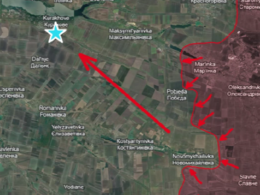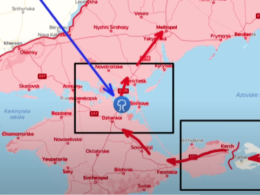12 December 2024: Today there are a lot of updates from Crimea.

Here, Ukrainian forces successfully misled the Russians to anticipate a missile strike on the mainland, before targeting them in a surprise attack with their latest development in the field of naval drones. This daring attack with new features, including FPV drones and machine guns on board, not only caused significant damage, but also showcased the further evolution of Ukrainian military capabilities.
As a preparation for their main strike, the Ukrainians launched a misleading operation in the days before. They targeted several Russian air defense assets throughout Crimea, including a Podlyot mobile radar system in the northwestern part of the peninsula and an S-400 air defense system near Simferopol. This activity led the Russians to expect an imminent attack from the air, diverting their attention from the sea.

Then a Russian military analyst broke the news about a Ukrainian raid in the Black Sea by claiming that the gas platforms used as visual and radar observation points by the Russians had been attacked. He sounded the alarm that the Ukrainian forces have not only used traditional naval drones in this attack, but also modernized versions able to carry FPV drones on board that can independently strike targets. He also claimed that some of the Ukrainian naval drones mysteriously disappeared during the overnight strike, indicating possible new operational capabilities.
More information became available when later the Security Service of Ukraine published geolocated footage showing Ukrainian naval drones destroying Russian surveillance systems on gas platforms off the west coast of Crimea in the Black Sea. This is a repeated strike against these platforms, as Russians not only use these platforms for surveillance, but also for launching various missiles against Ukrainian cities and military targets.

To understand how important this development is, we need to look at the tactical evolution of the Sea Baby drones. Previously, the biggest vulnerability of these Ukrainian naval assets was their inability to defend against helicopters, which could easily detect and destroy them as the sea drones could only attempt to evade their fire.
With the addition of large-caliber 12.7-millimeter machine guns integrated with advanced ballistic targeting systems that can auto-lock on incoming threats, Sea Baby drones can now actively engage even formidable opponents like heavily armed helicopters. The shocking footage from the Ukrainian Navy from this recent operation proves how the drones successfully fended off Russian helicopters and patrol boats, firing against them as soon as they were in range, reportedly inflicting significant damage and casualties among the Russian soldiers.
Trending Now
Their ability to return fire disrupted interception attempts, making it harder for Russian forces to neutralize them, and even gave them time to disappear safely back into the open sea and return to their bases which instilled additional shock into the involved Russian personnel. The recent upgrades demonstrate a significant leap in their tactical and technological capabilities, transforming them from simple explosive-laden vessels into versatile combat platforms.

Through this development, Sea Baby drones can now leverage their multi-role capabilities for maximum tactical advantage. Beyond their enhanced firepower, these drones are also used as platforms for smaller FPV drones, which can independently strike targets such as coastal defense systems, patrol boats, and helicopters if they stray too close or gather reconnaissance data. This dual-layered approach allows Ukrainian forces to execute precision strikes while simultaneously defending the naval drones against air and surface threats. For example, this was also confirmed during the latest raid as carried FPV drones enabled the coordinated assault and effective post-strike monitoring.
Overall, the Sea Baby's evolution showcases Ukraine's adaptive and innovative approach to modern warfare. By addressing critical vulnerabilities, integrating new capabilities, and repeatedly targeting high-value assets such as the Crimean Bridge and Russian naval infrastructure these drones continue to shift the balance in contested areas like the Black Sea, presenting a robust response to Russia's military presence. The new sea drones are not only tools for direct strikes but also function as platforms for psychological and operational leverage, being able to conduct hit-and-run strikes against long-distance targets on the open seas.
In our regular frontline report, we pair up with the military blogger Reporting from Ukraine to keep you informed about what is happening on the battlefield in the Russo-Ukrainian war.





